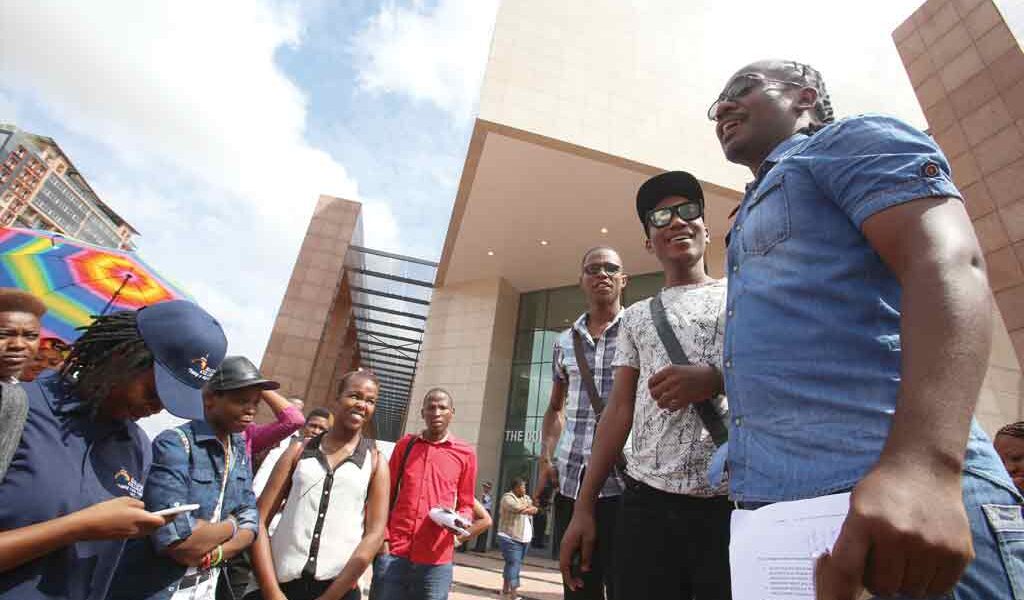Perhaps it is time to acknowledge that the Christian doctrine is an inadequate lens to use in discussing homosexuality
Lame Olebile
Pastor Anderson’s appearance here in Botswana was an insult but also an unveiling of a bigger question about Christianity and homosexuality. For many years, activists, my-self included, have strived to queer-up the Bible. We have looked for ways to find chapters that embrace homosexuality or embrace sexual diversity but all we could find were chapters that spoke of unconditional love and non-judgment.
Those are great values however, in the same book, we also found chapters that called homosexuality a sin and instructed that death was the appropriate punishment for this act. Pastor Anderson, while incredibly dramatic, violent and verbally abusive, laid out the Bible’s truth as it is. There is no space for people like me, lesbian, gay, bisexual, in his Bible.
The ‘Kill the Gays’ Pastor Anderson uses the Bible as the grand source of his convictions, from which, he shall not be moved. This begs the question of whether it will ever be possible to reconcile Christianity with homosexuality. The Bible is frequently quoted as being anti-homosexual according to Leviticus 18:22 and 20: 13 while dialogue on homosexuality has largely come from a human rights perspective. Our sexuality has become a matter of public discourse, with some opponents giving clear instructions as to how many years in jail we should face for loving the person of the same sex. While the number of Christian supporters that have come out to motivate the acceptance gays and lesbians is commendable, it is becoming clearer with each dialogue that there no place for homosexuality in Christianity.
Perhaps it is time we stopped looking for justice and acceptance in the Bible. In the same breath where the Bible speaks about compassion, love and non-judgment, the Bible also acknowledges that homosexuality is a sin. If homosexuality is a sin such as all other sins (including thievery and adultery), then shouldn’t it follow that homosexuals must enter the temple of the Lord, accept Jesus as their saviour and repent as would any other sinner? If we acknowledge that homosexuality is a sin then is there a future where a pastor may officiate at the wedding of two homosexual men? Would that be blessing the sin and encouraging the normalization of the sin of homosexuality?
Perhaps it is time to acknowledge that the Christian doctrine is an inadequate lens to use in discussing homosexuality. In a country indicated to be predominantly Christian, the discussion about gay and lesbian people has been violent and isolating. The pockets of acceptance within the Christian leadership, while a positive thing, only muddy the waters of what should be a conversation about the ability of one to live their lives free from violence, discrimination and hate. The conversation should not be about whether or not gays and lesbian are accepted in the Bible and what that means for their freedom to enjoy their rights as full human beings. It should be about how we can recreate society to ensure that homosexual people are treated as equally as heterosexual people. There is no one doctrine that should have a monopoly on how we can talk about the lives of millions of gays and lesbian across the world and how they deserve to live their lives. Furthermore, the selective application of Christian laws has turned homosexual people into pariahs by insisting on a hierarchy of sins, homosexuality being the most outrageous of sins. The stigma, anxiety and secrecy that a homosexual person has to live with far out-weighs the stigma associated with being a male adulterer. The Christian lens is inadequate, far too ambitious and selective in its application.
Pastor Anderson’s arrival here was an answer to a question and perhaps the reflection on a debate about how we use our values to restrict the enjoyment of other people’s rights while they do not do the same to us. It is a question of why we continue to subject gay and lesbian people to the violent rejection of Christian doctrine and spaces while this doctrine does not govern our lives, in practice. It is a question of whether this form of abuse is acceptable just because the Bible says homosexuality is a sin. It is unjust to insist on continuing to debate whether gay and lesbian people should have the same rights as heterosexual people when tomorrow, your views could change. Why must one’s life hinge on the changeable views of some? I have written before of the importance of debate in social development. However, something’s got to give. Christian doctrine should not set the standard for who gets to enjoy their rights fully and who does not. That is not justice because, as explained by Pastor Anderson, a child who dis-obeys their parents may be taken out into the yard and stoned to death. How can that be just?
In a diverse society such as ours, our debates should determine how we reform our structures, policies and laws to make them more just and inclusive. Hate speech motivated by Christian values must never be regarded as acceptable. Similarly, laws created from and justified by the Bible must be interrogated from a human rights perspective. Their relevance to our lives and the harm they cause must be the centre of this investigation. To be subjected to the Christian standards and the views of another is a way to deny me and other homosexual people, the agency to determine what we may do with my life while you enjoy freedoms that are never questioned because of your heterosexual privilege. This denial of my humanity is not the preservation of morality. In fact, it may very well be the violation of morality and my basic humanness.

